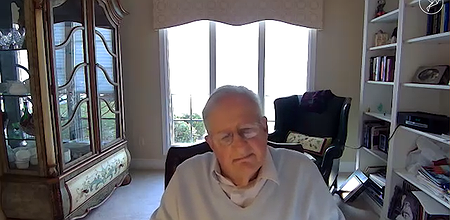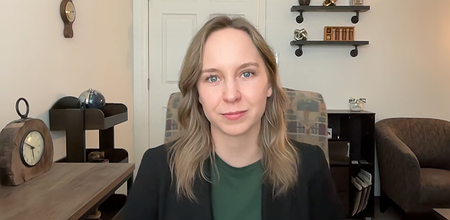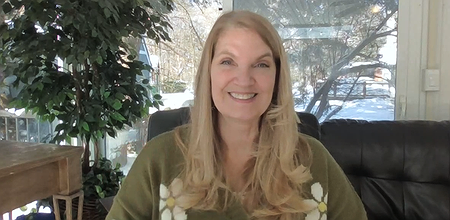- Analyze the impact of global stressors on the nervous system
- Co-regulate with clients using therapeutic empathy in clinical settings
- Practice tools and techniques to manage stress
- Implement self-care practices that calm the nervous system
Overcoming Compassion Fatigue as Mental Health Professionals
Dr. Patti Ashley, Psychologist
Master evidence-based techniques to maintain therapeutic presence while preventing secondary trauma and enhancing clinical effectiveness
 Introduction to key constructs and practices
Introduction to key constructs and practices
Excerpt:
- 1h30 of continuing education
- 12 lessons that last from 5 to 15 minutes each
- 1 certificate of achievement
- 1 PowerPoint
- 1 bibliography
- 1 course evaluation
- 7-day money back guarantee
- Unlimited access
- 72% of participants who completed the satisfaction survey declare they would recommend this course to a colleague
Overview
Secondary trauma exposure significantly impacts clinical effectiveness, yet traditional self-care approaches often fall short in addressing the neurophysiological demands of therapeutic work. This advanced training integrates Polyvagal Theory with clinical practice to address compassion fatigue at its core.
Led by renowned Dr. Patti Ashley, this training strengthens your ability to maintain therapeutic presence while protecting your own nervous system. Drawing on the principles of Polyvagal Theory, you’ll integrate evidence-based strategies for co-regulation, therapeutic empathy, and nervous system regulation into your clinical practice.
Key components include:
- Implementing precise neurophysiological strategies to maintain regulated states during challenging clinical encounters
- Strengthening your capacity to recognize and address early signs of autonomic dysregulation
- Integrating right-brain psychotherapy techniques to enhance therapeutic effectiveness
- Developing personalized protocols for maintaining clinical presence during intense emotional engagement
This training transforms theoretical understanding into practical clinical tools, enabling you to maintain therapeutic effectiveness while protecting your capacity for sustained empathic engagement. The skills acquired directly enhance clinical outcomes while preventing professional depletion.
Accreditation
Collège des médecins du Québec
For physicians who practice psychotherapy, training recognized by the Ordre des psychologues du Québec is automatically considered as activities adopted by the Collège des médecins, in accordance with Article 3 of the Regulation.
For physicians who do not practice psychotherapy, the College evaluates each recognition request based on the following criteria:
- the relevance of the activity to the practice of the profession
- the skills and experience of the trainer
- the quality of the content and its adequacy with the physician's practice
- the pedagogical framework of the activity
- the quality of the documentation provided
- compliance with the training objectives set out in the regulation
- the presence of a certificate of participation or an evaluation
About the expert

Dr. Patti Ashley, PhD, LPC is a renowned psychologist and trauma specialist with over 40 years of clinical experience treating complex trauma and narcissistic abuse. As founder of Authenticity Architects, she pioneered innovative approaches integrating neuroscience, attachment theory, and developmental psychology.
Her groundbreaking work on shame-informed therapy has transformed treatment protocols for survivors of narcissistic abuse. Dr. Ashley holds a PhD in Psychology from the Union Institute and University, with additional specialization in developmental psychology and trauma treatment.
A respected researcher and author, she wrote the influential text "Shame-Informed Therapy: Treatment Strategies to Overcome Core Shame and Reconstruct the Authentic Self" (2020). Dr. Ashley regularly conducts advanced clinical trainings internationally, helping practitioners develop expertise in trauma-informed, attachment-based approaches to healing.
Her integrative treatment model combines:
- Neurobiological trauma processing
- Attachment-based interventions
- Somatic regulation techniques
- Identity reconstruction protocols
- Shame-informed therapeutic strategies
Learning objectives
Learning material
A theoretical course illustrated with clinical examples. This course is composed of videos of 5 to 15 minutes each. The PowerPoint of the course to download.
Syllabus
- PowerPoint
-
Understanding the Mental Health Crisis and Therapeutic Foundations
- 1. Introduction
- 2. Today's mental health crisis
- 3. Polyvagal theory and the ANS
- 4. Four therapeutic R s
- 5. Right brain psychotherapy
-
Strategies for Resilience and Compassion in Mental Health Practice
- 6. Strategies of disconnection and defense against shame
- 7. Therapeutic empathy-four skills at once
- 8. Tools to tame stress part 1
- 9. Tools to tame stress part 2
- 10. Healing your heart
- 11. Meditation practice
- 12. Conclusion
- Bibliography
CE Credits
Download a certificate of successful completion.
Audience
This training is intended for mental health professionals.
Registration
Ask a question
Do you have a question? Then email us at contact@asadis.net
Frequently asked questions
-
Is there an evaluation at the end of the course?
To validate the achievement of the learning objectives, a final evaluation in the form of true/false questions is required. It must be completed in order to obtain the certificate of completion.
In addition, an optional self-assessment is offered at the beginning and end of the course, allowing you to measure your progress on the targeted skills.
These evaluations are not graded and are intended primarily to support your professional reflection.
-
I have a disability. Can I receive specific support?
Yes! This training is offered as a pre-recorded video format, without subtitles. If you have a disability, we can provide an adapted alternative (technical assistance for viewing or individual supervision). For any request, please contact our disability coordinator at the following address: contact@asadis.net
-
How long do I have access to the course?
After your registration, the course is accessible anytime and from anywhere with unlimited access.
-
When does the course start?
That is entirely up to you! When you buy a course, you'll receive an access link that you can activate when you want.
-
Is there a student rate?
Yes there is! To learn more, email us at contact@asadis.net.
You may also be interested in:
Legal notice
The courses offered by ASADIS are accredited by different professional organisations. In addition, ASADIS is approved by the Canadian Psychological Association to offer continuing education for psychologists. ASADIS maintains responsibility for the program.
The CPA’s approval of an individual, group, or organization as a CE Sponsor or Provider is restricted to the activities described in the approved application or annual report form. The CPA’s approval does not extend to any other CE activity the Sponsor or Provider might offer. In granting its approval, the CPA assumes no legal or financial obligations to Sponsors, Providers, or to those individuals who might participate in a Sponsor or Provider’s CE activities or programs. Further, responsibility for the content, provision, and delivery of any CE activity approved by the CPA remains that of the CE Sponsor or Provider. The CPA disclaims all legal liability associated with the content, provision, and delivery of the approved CE activity.






